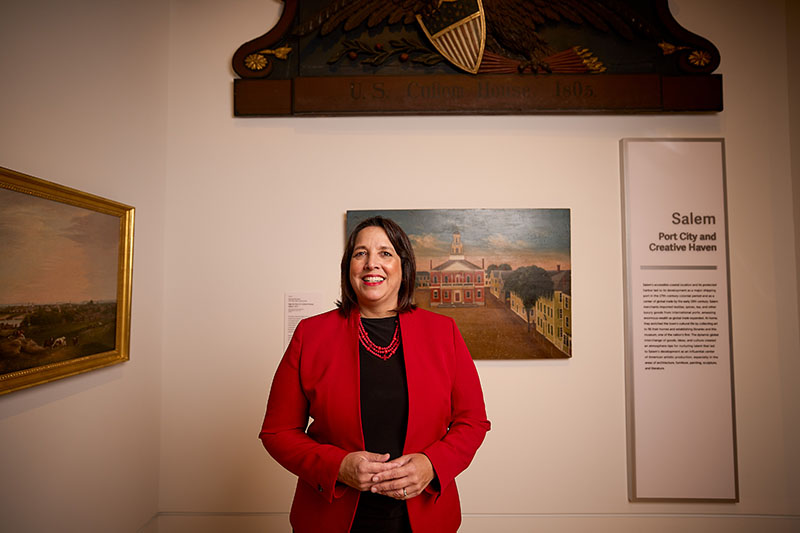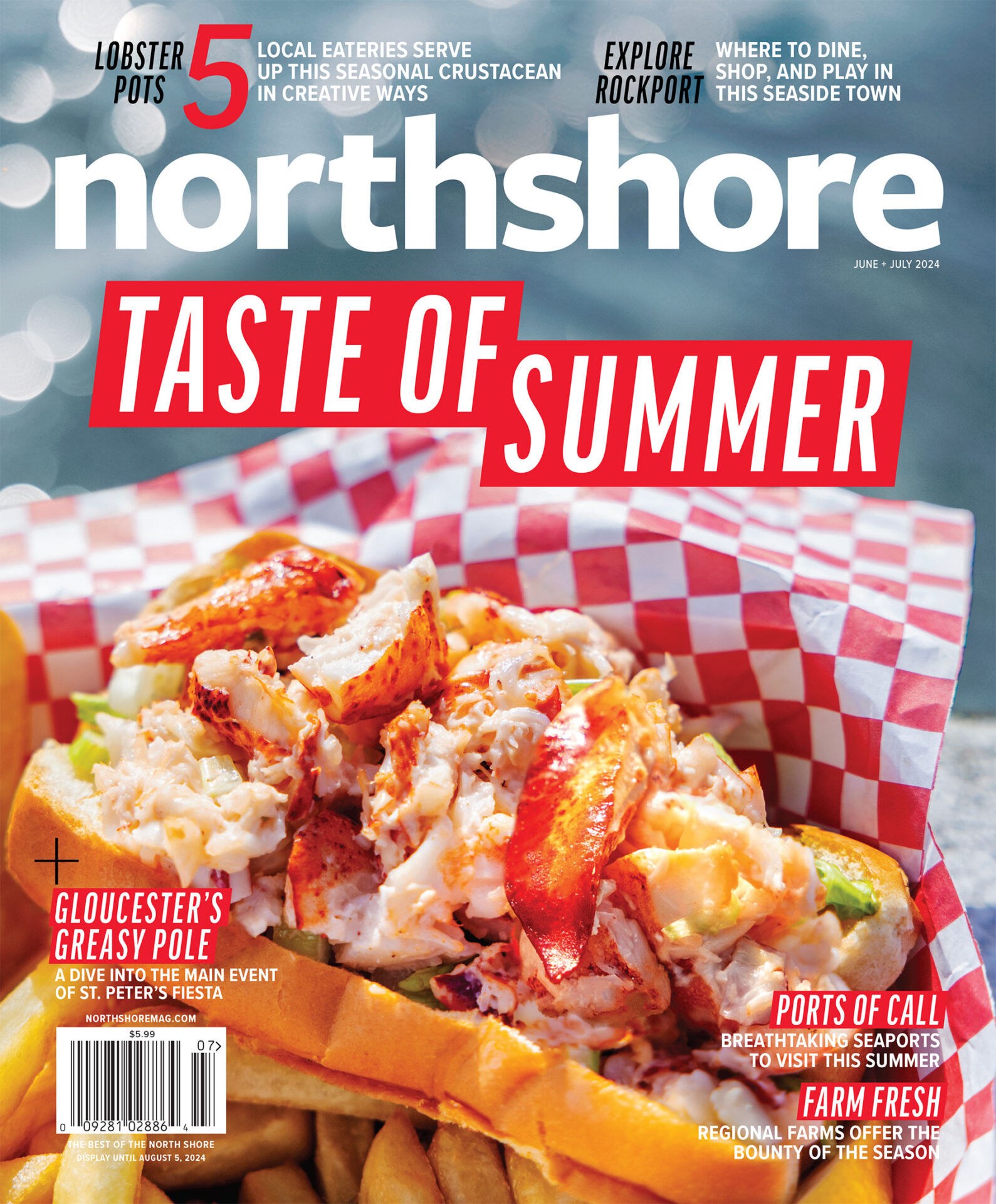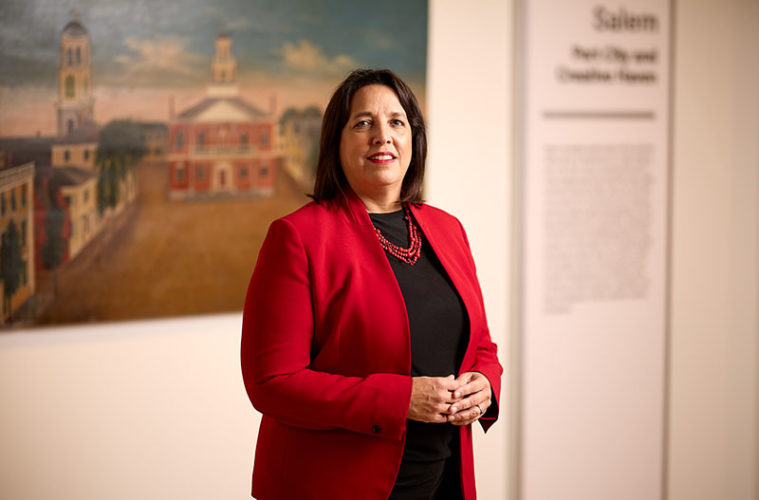On November 8, the Massachusetts races for governor and lieutenant governor were among the first to be called nationwide. So, shortly after 8 p.m., Attorney General Maura Healey and Salem Mayor Kim Driscoll became the first all-female state-level executive team ever elected in the country.
Driscoll is no stranger to breaking glass ceilings: In 2005, she beat out two male opponents, including an incumbent, to become the first woman elected mayor of Salem, a position she then held onto for 17 years. Driscoll came to Salem in 1986 as a college student and ended up making the city her home—and her career.
As Driscoll prepared to head from Salem to the State House in Boston, we sat down at the Peabody Essex Museum to talk about her time as mayor, her goals as a statewide leader, and what makes the North Shore such a special place to be.
Why did you decide to stick around full-time after college?
I just fell in love with the city. When you’re a Navy brat, you move around every three to five years, so I didn’t really have a hometown. When I came here, I felt like I had a hometown. And it’s a really diverse community. My mom is from Trinidad, my dad is from here, so I felt very much at home in that you saw diverse people and populations. That makes it more livable.
How did you get into municipal leadership and politics?
What led me into local government was an internship in the city of Salem’s planning department. That really, honestly, opened my eyes to the power of local government and how many things you have to have your hands in to actually make the lives of the people who live here different, and hopefully better.
You then worked in Chelsea as [chief legal counsel and later as deputy city manager]. How did that prepare you for leadership in Salem?
I had the amazing opportunity to go work in Chelsea as they were coming out of receivership—to work in the early days of what that meant, recodifying laws, developing re-engagement with residents, renewed accountability for local government, and renewed investment. It showed me first-hand who pays the price for failures in government and what you can do when you really band together with an aligned vision.

How did that inform what you did in Salem when you joined city council and later became mayor?
Working in Chelsea showed me what happens when you let politics and disengagement rule, and what can happen when you come together with a professional mindset. We really wanted to think about how you get value out of where you live. How do we think about the most important things that local government delivers on: education, public safety, public works? And how do you drive that vision with a collection of people?
What are you most proud of about your accomplishments in Salem?
There’s a number of things: When I took office we had an old coal-fired power plant on the waterfront. Our #1 taxpayer, a big job producer, but it also spewed out a lot of things that weren’t good for the community. Today we’re looking at the same space being the hub for offshore wind; it’s got a cleaner more efficient natural gas facility that has a hard stop on it. At one point we had turned our back on our waterfront, so key to our prominence. I think there’s a rebirth going on along the waterfront that’s pretty exciting.
The second thing I’d say is we’ve really developed a culture of continuous improvement within local government. When I came here, we didn’t think about how we professionalize operations. I think we’ve baked in a culture of wanting to do things the right way and wanting to make sure politics doesn’t drive every agenda item. I think that will continue—I certainly hope it will.
What are your priorities going to be as lieutenant governor?
So much of the government we rely on in our daily lives—educating our kids, keeping neighborhoods safe, investing in those places you make memories, driving our local economy—that happens from local government. We need to make sure they have a strong strategic ally in everything they’re doing, and I want to play that role.
Why run for lieutenant governor? Why set your sights beyond Salem?
I’ve been mayor now for 17 years and I’ve loved every single day of it. I am bittersweet about leaving. Serving as mayor has helped me understand that a great city doesn’t just happen by accident and you really do need strong state partners. I’m hoping I can take that lens to help us grow as a commonwealth.
What does it mean to you to be a role model, a pioneering woman?
Somebody has to be first, and I’m glad it could be me here in Salem, and Maura Healey and myself as a team up at the State House. But after that I really do think it’s about experience. I think people voted for us because they think we have the most experience and we’re going to be able to get stuff done. But it does have this added sense of responsibility: We have a responsibility to make sure we’re not the last.
Now let me ask some fun questions about your favorites in Salem and on the North Shore. What’s your favorite ice cream?
I’m a big Friendly’s person—I like the chocolate almond. But we don’t have any Friendly’s here, so I’m in the Market Basket freezer aisle to get my fix.
Favorite beach?
That’s easy. Winter Island, Waikiki Beach. My kids think that’s the only Waikiki Beach.
Place to get dinner?
There’s so many favorites in Salem to choose from, but the place we end up at a lot is Turner’s.
Museum?
Come on! [gestures around the PEM] Seriously, how lucky are we to have this amazing institution in Salem?
To read more about what Driscoll—and other Salem community leaders love about the museum, visit this post at the museum blog.
Interview has been edited for length and clarity.

